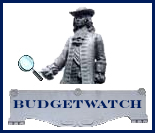- Home
- About
- News
- Tax Reform
- Ethics Reform
- Budget Reform
- Reformer’s Roundtable
- Contact Us







It's Time For Philadelphia To Save For A Rainy Day
 Anyone who creates a budget -- whether it is for a household or for a major city -- understands that it is prudent to save money when one can to create a reserve for when times are not so good. From the fable, we are warned to be like the ant that works all summer to save food for the long winter instead of the grasshopper that plays in the sun and then faces the cold with bare cupboards. Our celebrated founding father tells us that "a penny saved is a penny earned."
Anyone who creates a budget -- whether it is for a household or for a major city -- understands that it is prudent to save money when one can to create a reserve for when times are not so good. From the fable, we are warned to be like the ant that works all summer to save food for the long winter instead of the grasshopper that plays in the sun and then faces the cold with bare cupboards. Our celebrated founding father tells us that "a penny saved is a penny earned." More than a decade ago, Philadelphia was on the brink of bankruptcy, but with tremendous discipline and good fortune, the city built a fund balance surplus of $300 million by 2000. Unfortunately, like that grasshopper we spent that surplus away and promptly flirted again with fiscal crisis without pennies earned or saved.
It is past time that Philadelphia join the many other states and cities that have a rainy-day fund to help discipline spending when times are good and provide reserves that prevent unwise cuts when times are not so good. The vast majority of states have established rainy-day funds or similar revenue-stabilization mechanisms. In addition, many cities, including New York City, Houston, Detroit, Baltimore, and San Antonio, have similar funds. Throughout the country, rainy-day funds provide governments with important budgeting flexibility during difficult economic times.
In Philadelphia, the establishment of a rainy-day fund could provide the city with fiscal discipline. By restricting the use of some surplus funds, the city will be less able to expand frivolous spending in times of plenty and better able to weather a slow economy. Such a move would also improve the city’s bond rating, which will reduce the cost of city borrowing.
Additionally, the move could help eliminate one of the more frustrating two-steps of the city's annual budget dance. While many of the assumptions made in creating the budget turn out to be darn close to the reality that unfolds during the actual fiscal year, some of the predictions made in the budget inevitably turn out to be wrong. While it is always better to be conservative, each year in recent memory, the city administration has systematically underestimated the amount it will generate in local tax revenues. When those underestimated revenues have materialized, the city administration has used the additional funding to spend on priorities that were never part of the enacted budget -- often after arguing against other policy prescriptions, saying that the city could not afford them. A rainy-day fund would discourage the systematic underestimation of revenues, which should yield a more transparent budget process and an improved debate about the city's spending priorities.
On Wednesday, April 19th at 10:00 am, City Council will consider legislation to establish a rainy-day fund. In the past -- despite universal agreement that such a rainy-day fund is sound budgetary policy and a good idea -- City Council and the Mayor have not been able to agree on how to incorporate a rainy-day fund in the city's budgetary process. With the city once again enjoying the relative prosperity of a budget surplus it is time that we create a rainy-day fund as a mechanism to enforce budgetary discipline so that we emulate the ant who saved during the summer months. The pennies we save will earn the thanks of Philadelphians in future years who will be better prepared to deal with the inevitable coming of winter.